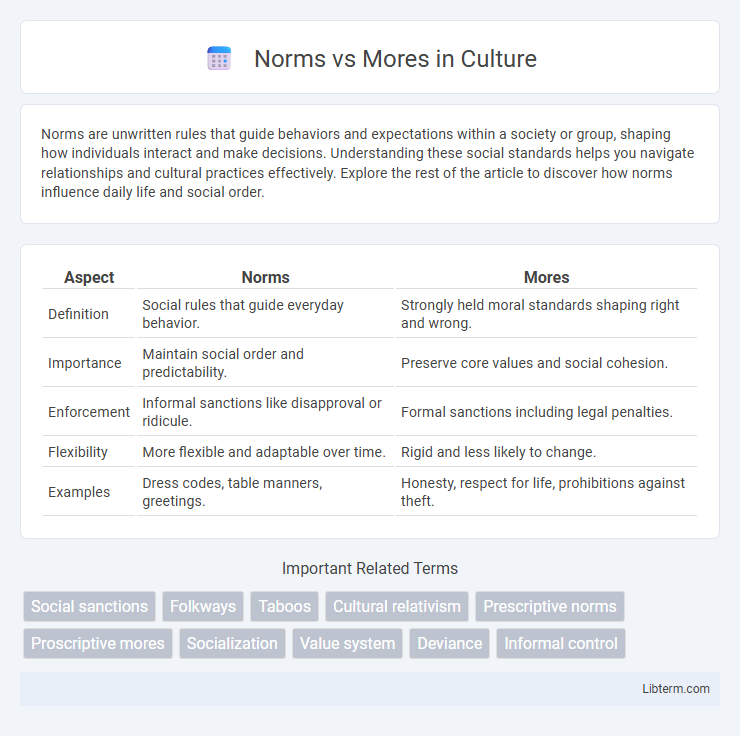Norms are unwritten rules that guide behaviors and expectations within a society or group, shaping how individuals interact and make decisions. Understanding these social standards helps you navigate relationships and cultural practices effectively. Explore the rest of the article to discover how norms influence daily life and social order.
Table of Comparison
| Aspect | Norms | Mores |
|---|---|---|
| Definition | Social rules that guide everyday behavior. | Strongly held moral standards shaping right and wrong. |
| Importance | Maintain social order and predictability. | Preserve core values and social cohesion. |
| Enforcement | Informal sanctions like disapproval or ridicule. | Formal sanctions including legal penalties. |
| Flexibility | More flexible and adaptable over time. | Rigid and less likely to change. |
| Examples | Dress codes, table manners, greetings. | Honesty, respect for life, prohibitions against theft. |
Defining Social Norms
Social norms are unwritten rules that govern acceptable behavior within a society, shaping everyday interactions and maintaining social order. These norms vary across cultures and contexts, influencing actions through shared expectations rather than formal regulations. Unlike mores, which carry moral significance and stricter enforcement, social norms often guide routine conduct and social etiquette.
Understanding Mores
Mores are social norms that hold significant moral importance within a culture, often linked to core values and ethical standards. Violating mores typically results in strong social disapproval or legal consequences due to their role in maintaining societal order. Understanding mores requires recognizing their function in shaping behaviors that uphold community integrity and moral expectations.
Key Differences Between Norms and Mores
Norms are general rules of behavior that guide everyday interactions and social expectations, while mores are stricter moral customs essential to the welfare of society. Norms can be informal and flexible, varying across cultures, whereas mores carry stronger sanctions and often relate to fundamental ethical principles. The key difference lies in the level of social significance and enforcement, with mores demanding conformity to values critical for social order and cohesion.
Origins of Norms and Mores
Norms originate from a society's collective agreement on acceptable behaviors and are often codified through laws and social rules to maintain order. Mores develop from deeply embedded cultural values and moral beliefs, reflecting what a community considers essential for its social cohesion and ethical standards. Both norms and mores evolve from historical, religious, and cultural influences, shaping behavioral expectations within societies.
Cultural Impact of Norms and Mores
Norms provide everyday behavioral guidelines shaping social interactions, while mores enforce deeply held cultural values with stronger moral significance. The cultural impact of norms establishes routine social order, influencing etiquette and community cohesion, whereas mores uphold core ethical standards, often dictating laws and prohibiting taboo behaviors. Both play critical roles in maintaining societal stability and transmitting cultural heritage across generations.
Examples of Norms in Society
Examples of norms in society include dress codes, such as wearing business attire in professional settings, and social etiquette like saying "thank you" or queuing in lines. Norms also guide behaviors like punctuality for appointments and refraining from loud conversations in libraries. These unwritten rules maintain social order and facilitate predictable interactions within communities.
Examples of Mores in Society
Mores in society include prohibitions against theft, murder, and incest, which are considered essential for social stability and moral order. Violating mores often results in severe penalties, such as imprisonment or social ostracism, reflecting their critical role in maintaining community values. These deeply held norms contrast with folkways by emphasizing behaviors tied to ethical standards and collective well-being.
Consequences of Violating Norms vs. Mores
Violating norms typically results in mild social sanctions such as disapproval or informal reprimands, which help maintain everyday social order. In contrast, breaching mores often triggers severe consequences, including legal penalties, ostracism, or moral condemnation, reflecting their deep-rooted connection to a society's ethical standards. The distinction in enforcement severity underscores the critical role mores play in preserving fundamental societal values.
The Evolution of Norms and Mores Over Time
Norms and mores evolve as societies experience cultural, technological, and economic changes, reflecting shifts in collective values and behaviors. Norms, being informal social rules, often adapt more readily to new circumstances, while mores, grounded in moral beliefs, tend to change more gradually due to their deeper societal significance. Historical transformations like industrialization and globalization illustrate how evolving norms and mores reshape social expectations and ethical standards across communities.
The Role of Norms and Mores in Social Cohesion
Norms function as established standards of behavior that guide daily interactions and maintain order within a society, while mores represent deeply rooted moral beliefs that enforce ethical conduct and social values. Both norms and mores contribute to social cohesion by fostering shared expectations and reinforcing a collective identity among community members. Violations of mores typically result in stronger social sanctions than breaches of norms, underscoring their critical role in upholding societal stability and integrity.
Norms Infographic

 libterm.com
libterm.com